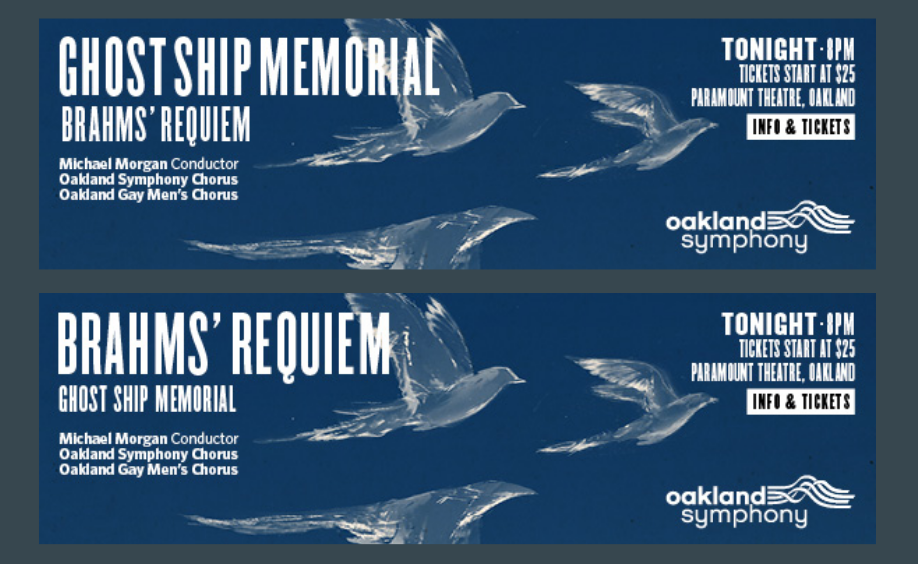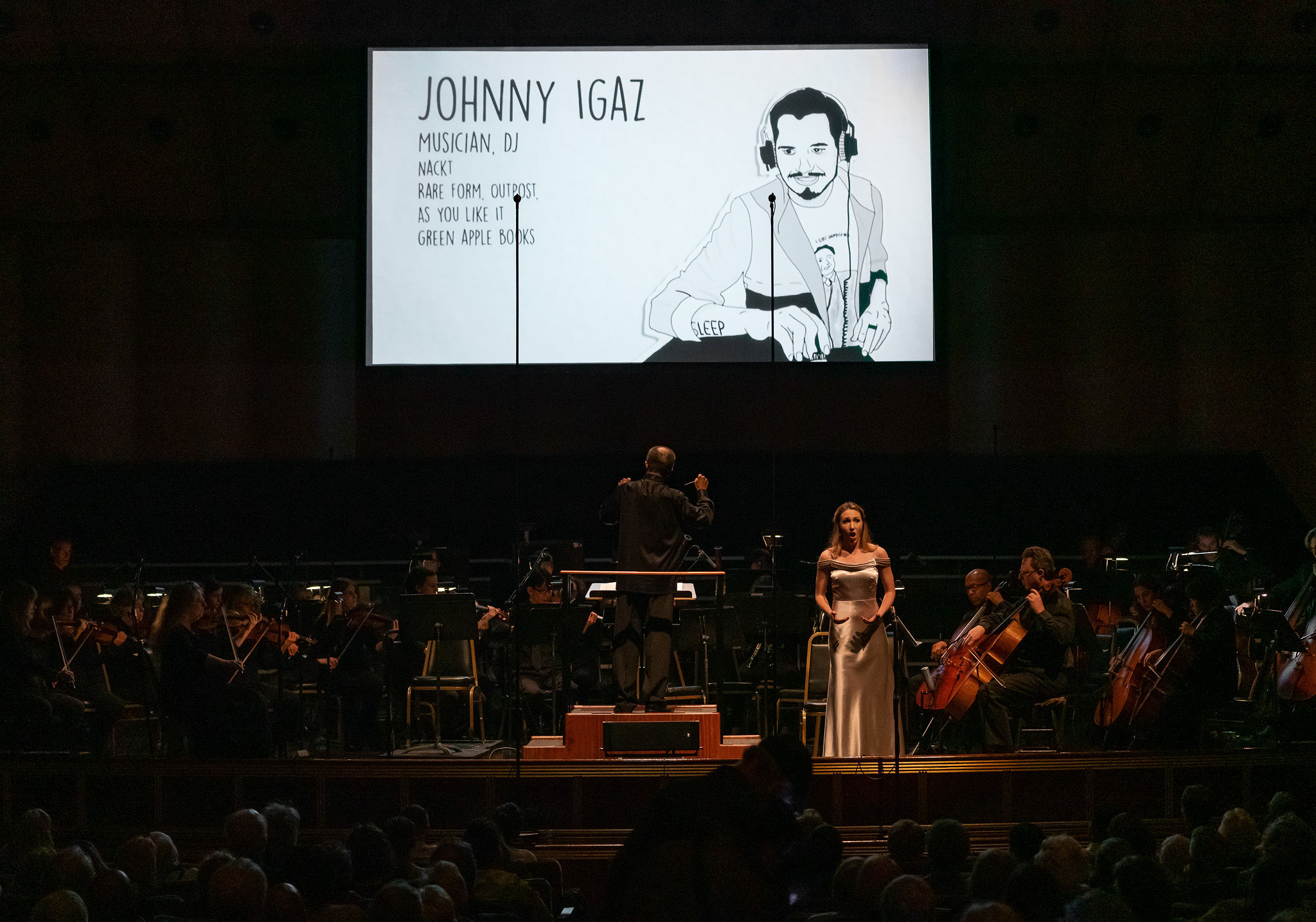From October 2018-March 2019, 21 diverse organizations participated in the First Wave pilot of the OF/BY/FOR ALL Change Network. We’re sharing stories from their journeys to become of, by, and for the communities that matter most to them. These stories were written by Titania Veda in partnership with the First Wave teams.
The Oakland Symphony prides itself for being a community-centered orchestra. Caring about the community is its identity. This is what gives it an edge over some of the larger, more prestigious and more well-funded orchestras in the US.

The Oakland Symphony has carved a name for creating diverse and adventurous programming. (Image courtesy of the Oakland Symphony)
Oakland, California is a city famous for its cultural and ethnic diversity, reflected in its social justice legacy and racial makeup. The Oakland Symphony serves Oakland’s diverse population. It offers non-traditional programming featuring diverse repertoire and political themes. Their most popular concert is the "Playlist", an annual concert curated by cultural leaders like civil rights activist Dolores Huerta and socio-political comedian W Kamau Bell. The symphony is led by Michael Morgan, a celebrated (and rare) African-American music director. It boasts a culturally diverse Youth Orchestra and education programs with Oakland schools.
Despite these unique characteristics and their desire to engage with this diverse population, the Orchestra has struggled to maintain relevance and ongoing, authentic connections.
Feet to the Fire: The Ghost Ship Concerto
In 2018, the symphony faced a challenging situation which demonstrated how their community holds it accountable. They programmed the Requiem for Ghost Ship concert in response to the 2016 Ghost Ship tragedy, a fire at an artist collective warehouse that took 36 lives. The intention was to commemorate survivors and victims of Oakland’s deadliest blaze. The concert included a new work by Richard Marriott called the Ghost Ship Concerto and the Brahms Requiem.
But the message quickly became clouded. Staff turnover at the small organization led to unclear goals and a new direction in the marketing of the concert. The advertising shifted to focus more on Brahms and less to paying tribute to a grieving community. Staff members did not have a direct connection to the Ghost Ship community to include them. Thus, they were unsure how to engage them before the concert. Staff assumed the communities would respond in a positive way but didn’t have a process to turn that assumption into a certainty.

The original ticket design (top) highlighted the Ghost Ship memorial. The change in advertising direction resulted in a redesign (bottom) that highlighted the Requiem instead. (Image courtesy of the Oakland Symphony)
With the tragedy still raw in people’s hearts, the Ghost Ship community were upset about the publicity surrounding the concert and their lack of involvement. A local activist with links to the Ghost Ship community reached out to express their distress. This spurred a last-minute effort to change the direction and community perception of the concert. With the help of the attorneys representing the survivors of the fire and the families of those who passed, the symphony connected with families and artists affected. They provided free tickets so members of the community could attend the concert. And the composer, Richard Marriott, did a pre-concert talk about the work he created to honor the "artists and dreamers lost in the Ghost Ship," some of whom he knew personally.
The symphony came away with three big lessons about their process for community involvement:
-
The need for intentionality: Community engagement requires planning with clear goals and implementation. The team needs clarity, a community engagements plan to develop community connections in order to avoid hurt, distrust, and confusion.
-
Awareness of limitations: If a single staff member “holds” a community relationship, then that relationship may be hard to sustain when that staff member moves on. Lack of human capacity has also resulted in an "engage and abandon" process when focused on programs that are one-off celebrations of a community. Staff need to find ways to manage and build sustained community relationships institutionally and not only personally.
-
The need for internal alignment: The whole team needs to have clear processes and work together to build deeper relationships with communities and encourage their participation. Without a structure to build relationships, there won’t be engagement.
“A big part of it is audience development. It’s structurally a last-minute rush, a one-off event, and a one-way engagement. We had no process of following up and getting feedback from groups on how to get more traction and make it more attractive for them,” said Carol Henri, a board director of the Oakland Symphony. As a trustee, Carol advocated for diversity beyond just the staff or the board members. “We need to get voices in places of influence,” she said.

Soloist Patricia Westley sings Take Care of This House as a slideshow memorializing artists who passed in the Ghost Ship Fire (Photo: Anthony "Mogli" Maureal)
Addressing the Gaps
The Ghost Ship experience and others inspired the Oakland Symphony to take action to become more responsive to the diverse communities of Oakland. They wanted to address these gaps in a more effective and impactful way.
In the OF/BY/FOR ALL Change Network, each organization picks a specific community to focus on involving them in a meaningful way. The Oakland Symphony already has a high percentage of white and comparable percentage African American members to the total population. But they identified a key gap in LatinX involvement and participation at the audience, staff, and board level. According to the East Bay Express newspaper, the LatinX community form over 17.5% of the population in Oakland. But less than half are part of the symphony’s audience base. The symphony saw this as an opportunity for potential growth and to be more OF and BY the fastest growing racial group in Oakland.
“How do you involve a community? Or know that what you're doing is not only FOR the community but also involves a BY?” said Warren Williams, Oakland Symphony’s education and community engagement director.
After exploring different paths forward, the symphony is now planning to form a community advisory board and to hire a LatinX community liaison to do more intensive work BY the community.
“The idea of the community board is to have people in the community who are here for the long term. It is less about reaching out to them about a particular project related to their community and more about having their input during the times when it has nothing to do with their specific sector,” said Caitlin Bryson, Oakland Symphony’s marketing manager.
The goal is to develop a feedback loop with the community and fuel ongoing relationships. They recognize the importance of having an OF/BY/FOR ecosystem that is part of the symphony’s culture.
“We want the audience to feel welcomed. We don’t want them to feel like it's a token gesture but that we are sincere and they're welcome and feedback is wanted and taken seriously,” said Caitlin. “We want them to know this is their Oakland Symphony and feel a sense of ownership that it belongs to them as residents of this city.”
